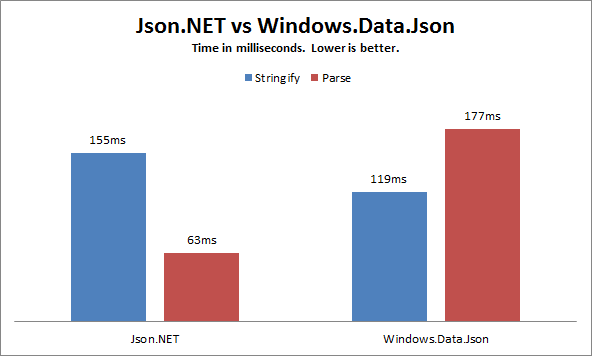Json.NET vs Windows.Data.Json
Windows 8 introduces a new way to work with JSON via the Windows.Data.Json namespace. Similar to LINQ to JSON in Json.NET it defines classes that can be used to parse values, strings, objects, and arrays from JSON text or serialize value types into JSON text.
Below is a comparison of Json.NET’s LINQ to JSON to Window 8’s Windows.Data.Json.
Creating JSON
The big difference between the two libraries when creating JSON is Windows.Data.Json requires string/integer/double values to be explicitly converted to JsonValue objects.
Note that there is a weird limitation to creating JSON with Windows.Data.Json: it doesn’t allow you to set properties to null or have null array values.
// Windows.Data.Json
// -----------------
JsonObject jsonObject = new JsonObject
{
{"CPU", JsonValue.CreateStringValue("Intel")},
{"Drives", new JsonArray {
JsonValue.CreateStringValue("DVD read/writer"),
JsonValue.CreateStringValue("500 gigabyte hard drive")
}
}
};
string json1 = jsonObject.Stringify();
// LINQ to JSON
// ------------
JObject jObject = new JObject
{
{"CPU", "Intel"},
{"Drives", new JArray {
"DVD read/writer",
"500 gigabyte hard drive"
}
}
};
string json2 = jObject.ToString();
Querying JSON
Windows.Data.Json requires a value to be cast to its exact type with the GetObject/GetArray methods before it can be used, making Windows.Data.Json’s code verbose compared to LINQ to JSON.
string json = @"{
""channel"": {
""title"": ""James Newton-King"",
""link"": ""http://james.newtonking.com"",
""description"": ""James Newton-King's blog."",
""item"": [
{
""title"": ""Json.NET 1.3 + New license + Now on CodePlex"",
""description"": ""Annoucing the release of Json.NET 1.3, the MIT license and the source being available on CodePlex"",
""link"": ""http://james.newtonking.com/projects/json-net.aspx"",
""category"": [
""Json.NET"",
""CodePlex""
]
}
]
}
}";
// Windows.Data.Json
// -----------------
JsonObject jsonObject = JsonObject.Parse(json);
string itemTitle1 = jsonObject["channel"].GetObject()["item"].GetArray()[0].GetObject()["title"].GetString();
// LINQ to JSON
// ------------
JObject jObject = JObject.Parse(json);
string itemTitle2 = (string)jObject["channel"]["item"][0]["title"];
Performance
Json.NET is slightly slower at writing JSON than Windows.Data.Json but considerably faster parsing.

Converting Between LINQ to JSON and Windows.Data.Json
Json.NET supports converting between the types of the two libraries. Use FromObject to convert a Windows.Data.Json value to LINQ to JSON and use ToObject to convert LINQ to JSON to Windows.Data.Json.
JsonObject jsonObject = new JsonObject
{
{"CPU", JsonValue.CreateStringValue("Intel")},
{"Drives", new JsonArray {
JsonValue.CreateStringValue("DVD read/writer"),
JsonValue.CreateStringValue("500 gigabyte hard drive")
}
}
};
// convert Windows.Data.Json to LINQ to JSON
JObject o = JObject.FromObject(jsonObject);
// convert LINQ to JSON to Windows.Data.Json
JArray a = (JArray)o["Drives"];
JsonArray jsonArray = a.ToObject<JsonArray>();